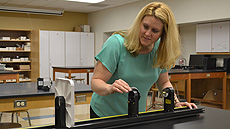From the lab to the classroom
 |
Physicist Jennifer Gimmell shares her love of physics with her students.
Photo courtesy of College of DuPage |
While she was earning her Ph.D. in particle physics, Jennifer Gimmell spent her time developing data analyses. Now she spends her days developing the next generation of scientists.
Gimmell teaches physics at Benet Academy, a private college-preparatory school in Lisle, Illinois, and as an adjunct physics professor at the College of DuPage, a community college in nearby Glen Ellyn.
"To me, this is my way of influencing science almost in the same way that I was before," Gimmell says. "But now I'm doing it from the inside."
Life as a particle physicist
Gimmell earned her bachelor's degrees in physics and mathematics from Hiram College, and she earned her master's degree and Ph.D. in particle physics from the University of Rochester. She did her graduate work on the CDF experiment at the Tevatron particle accelerator at Fermi National Accelerator Laboratory.
During her time at Fermilab, Gimmell worked in an analysis group specializing in studies of the top quark. She was also responsible for monitoring the CDF detector's radiation protection and for helping maintain the innermost layer of the detector, the silicon tracker.
Gimmell says the thing she enjoyed most about particle physics was working toward the common goal of better understanding how the universe works.
"Even though my thesis was such a narrow part of the answer to that question, knowing that you're contributing to the answer is pretty neat," she says.
As a graduate student at a large national laboratory, Gimmell often struggled to find her place. But this struggle helped to shape her, she says.
"I really think that working in such a large collaboration and always being put on the spot in collaboration meetings helped me to think a little quicker on my feet and be confident in what I do."
Read more
—Amelia Williamson Smith
|